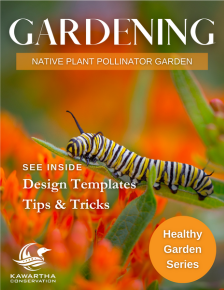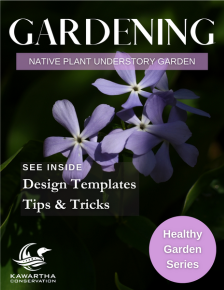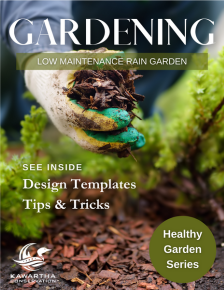Healthy Gardens
Our Native Plant Sale is now closed. Please subscribe to this page (lower right) to be notified when our future plant sales open.
If you are interested in creating or maintaining a healthy garden on your property, Kawartha Conservation can help. We provide funding to support healthy gardens and related projects that improve habitat and water quality across our watershed. Learn more and schedule a site visit to support your application for funding.
New garden guides available
Create healthy, natural, and stunning gardens on your property using our free garden guides. Complete with design templates, species lists, maintenance tips, and more, it's never been easier to create gardens that support pollinators, strengthen shorelines, and absorb pollutants and runoff.
Click on a guide below to download and get started.
Programs and services
Native plant sale |
|
Each spring and fall, the native plant sale provides locally sourced plant material for shoreline re-naturalization, habitat creation, erosion control, establishment of rain gardens and low maintenance property beautification. Native plants are plants are a key factor in achieving a healthy garden and have multiple benefits for your property enhancement projects including:
The 2024 Spring Native Plant Sale is now closed. Please subscribe to this page to be notified when the next sale opens. For more information on the Native Plant Sale, contact Ola Pasternak by email or by phone at (705) 328-2271 ext. 241 |
Creating a healthy garden
Explore the different types of gardens that you can plant and other things you can do to improve environmental sustainability on your property.
Garden Guides |
|
Create healthy, natural, and stunning gardens on your property using our free garden guides. Complete with design templates, species lists, maintenance tips, and more, it's never been easier to create gardens that support pollinators, strengthen shorelines, and absorb pollutants and runoff. Available guides include Native Plant Pollinator Garden, Native Plant Understory Garden, and Low Maintenance Rain Garden. Click on a garden guide below to get started. |
Pollinator garden |
|
Pollinators are animals, mostly insects, that transfer pollen from flower to flower, fertilizing plants. Creating healthy gardens with native flowering plants support local pollinators. They're important because they account for a significant amount of our food sources and ecological balances. See native plants for pollinators for detailed information. |
Rain garden / BlueScaping |
|
A rain garden is a landscaped depression that is planted with native shrubs, grasses and flowers. It's designed to collect rainwater that runs off hardened surfaces such as your roof or driveway. See the landscape design guide for low impact development and BlueScaping our neighbourhoods for more information. How it worksA rain garden slows and reduces stormwater runoff by temporarily holding it and allowing the water to soak into the ground. The native plants also help filter the contaminants and sediments that would otherwise be carried into your lake or the nearest water body through the storm water system. Here are a few things to consider when building one:
|
Shoreline garden |
|
View our shoreline owner's guide to lakeland living to learn how to develop a healthy shoreline garden. Healthy shoreline gardens can make a big difference, and provide many benefits including:
Shorelines are often called the "ribbon of life” because they're critical to the ecological health of lakes and rivers. |
Rain barrels |
|
Landowners can purchase rain barrels from their local municipality, garden centre, or hardware store. Please find information below on how to contact your local municipality to order rain barrels. City of Kawartha Lakes |
Low Impact Development (LID)
Low Impact Development (LID) is a practice of mimicking natural processes to protect water quality and associated aquatic habitat. When water runs over land, it picks up every small particle in its path, including pet waste, pesticides, automobile fluids, and cigarette butts. This water, called runoff, can impact our water quality and even our water quantity. Runoff-related problems are only exacerbated in areas with many roofs, driveways, parking lots, roads, and other ‘hard’ surfaces. By undertaking LID projects, we are helping our communities to 'soften' their landscapes to tackle flooding, erosion, and water pollution
Permeable Pavement in Port Perry |
|
Explore our latest initiative along Old Rail Lane in Port Perry, developed in collaboration with the Township of Scugog and RBC Tech for Nature. This project focuses on addressing stormwater runoff and enhancing the water quality of Lake Scugog through the implementation of permeable pavement. Our mission is to combat the adverse effects of stormwater runoff, which can harm aquatic life and water quality by transporting harmful chemicals and sediment into the lake. This innovative project utilizes permeable pavement, as opposed to traditional concrete or asphalt. Permeable pavement allows water to pass through, preventing flooding and reducing the influx of nutrient-rich stormwater into Lake Scugog, while providing a safe walking space for pedestrians. 5 key benefits of permeable pavement:
|
Additional resources
- Grow me instead - beautiful non-invasive plants for your garden
- Landowner guide to protecting water quality in the Kawarthas
- Society for Ecological Restoration Ontario - growers list
- Low Impact Development Residential Retrofits: Engaging Residents to Adopt Low Impact Development on Their Properties
- Raingardens: A How To Manual for Homeowners








